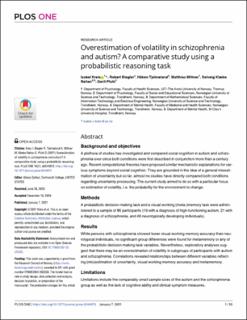| dc.contributor.author | Kreis, Isabel Viola | |
| dc.contributor.author | Biegler, Robert | |
| dc.contributor.author | Tjelmeland, Håkon | |
| dc.contributor.author | Mittner, Matthias | |
| dc.contributor.author | Reitan, Solveig Merete Klæbo | |
| dc.contributor.author | Pfuhl, Gerit | |
| dc.date.accessioned | 2021-02-17T10:31:20Z | |
| dc.date.available | 2021-02-17T10:31:20Z | |
| dc.date.created | 2021-01-08T10:50:23Z | |
| dc.date.issued | 2021 | |
| dc.identifier.issn | 1932-6203 | |
| dc.identifier.uri | https://hdl.handle.net/11250/2728633 | |
| dc.description.abstract | Background and objectives
A plethora of studies has investigated and compared social cognition in autism and schizophrenia ever since both conditions were first described in conjunction more than a century ago. Recent computational theories have proposed similar mechanistic explanations for various symptoms beyond social cognition. They are grounded in the idea of a general misestimation of uncertainty but so far, almost no studies have directly compared both conditions regarding uncertainty processing. The current study aimed to do so with a particular focus on estimation of volatility, i.e. the probability for the environment to change.
Methods
A probabilistic decision-making task and a visual working (meta-)memory task were administered to a sample of 86 participants (19 with a diagnosis of high-functioning autism, 21 with a diagnosis of schizophrenia, and 46 neurotypically developing individuals).
Results
While persons with schizophrenia showed lower visual working memory accuracy than neurotypical individuals, no significant group differences were found for metamemory or any of the probabilistic decision-making task variables. Nevertheless, exploratory analyses suggest that there may be an overestimation of volatility in subgroups of participants with autism and schizophrenia. Correlations revealed relationships between different variables reflecting (mis)estimation of uncertainty, visual working memory accuracy and metamemory.
Limitations
Limitations include the comparably small sample sizes of the autism and the schizophrenia group as well as the lack of cognitive ability and clinical symptom measures.
Conclusions
The results of the current study provide partial support for the notion of a general uncertainty misestimation account of autism and schizophrenia. | en_US |
| dc.language.iso | eng | en_US |
| dc.publisher | Public Library of Science | en_US |
| dc.rights | Navngivelse 4.0 Internasjonal | * |
| dc.rights.uri | http://creativecommons.org/licenses/by/4.0/deed.no | * |
| dc.title | Overestimation of volatility in schizophrenia and autism? A comparative study using a probabilistic reasoning task | en_US |
| dc.type | Peer reviewed | en_US |
| dc.type | Journal article | en_US |
| dc.description.version | publishedVersion | en_US |
| dc.source.journal | PLOS ONE | en_US |
| dc.identifier.doi | 10.1371/journal.pone.0244975 | |
| dc.identifier.cristin | 1867579 | |
| dc.description.localcode | Copyright: © 2021 Kreis et al. This is an open access article distributed under the terms of the Creative Commons Attribution License, which permits unrestricted use, distribution, and reproduction in any medium, provided the original author and source are credited. | en_US |
| cristin.ispublished | true | |
| cristin.fulltext | original | |
| cristin.qualitycode | 1 | |

